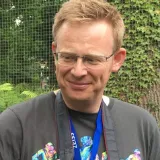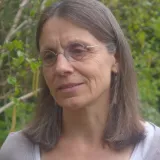Please note: this event has passed
You can register for this Inaugural Lecture on Eventbrite.
Join us to celebrate a special milestone for our new professors and hear about their inspiring career journeys. Doors for this event will open on 16:45 (BST), with the lectures to commence at 16:50. A drinks reception will be held at 18:00 immediately after the lecture.
Professor Simon Ameer-Beg
Quantitative Fluorescence Imaging for protein sensing in cancer
Abstract
The control of cellular function and intracellular signaling is clearly complex and highly regulated. Many signalling cascades have been extensively investigated and the relationships between proteins have been partially delineated using biochemical techniques. Microscopical techniques coupled with immunocytochemical methods have allowed researchers to image the relative localization of multiple signaling molecules. However, both types of measurement assume (different degrees of) cell homogeneity, which means that important variations in behaviour across the cell, and localisation of signalling events to specific parts of the cell, will be missed. Many intracellular structures are heterogeneous below the 200 nm length scale resolvable by widefield microscopy. Measurement of the near-field localization of protein complexes may be achieved by the detection of Förster resonant energy transfer (FRET) between protein-conjugated fluorophores. Combined with confocal or multiphoton techniques to examine the localization of effects in cellular compartments, FLIM/FRET allows us to determine populations of interacting protein species on a point-by-point basis at each resolved voxel in the cell. The use of ‘ensemble’ FRET/FLIM techniques to probe protein-protein interactions in intact cells is now an established technique.
Recent developments in high-speed and high-resolution FRET imaging will be presented and prospects for the future application of these techniques discussed.
Biography
Simon Ameer-Beg began his career in 1990 at the University of Essex with BSc(hons) and MSc in Laser physics. Joining British Nuclear Fuels Ltd in 1995 he developed ultrafast laser ablation for fabrication of microfluidic devices and femtosecond pump-probe spectroscopy of excited state proton transfer for fluorescence sensing applications where he obtained his PhD following research visits to Berlin (BESSY and MPI) and Florence (LENS). With the emergence of multiphoton microscopy as a novel field of ultrafast physics, Simon shifted careers into cancer research and the development of advanced microscopy at the Cancer Research UK funded Gray Cancer Institute (then at Mount Vernon Hospital). Since joining King's in 2006 as a non-clinical lecturer, he has developed an interdisciplinary research portfolio principally in the field of time-resolved multiphoton fluorescence lifetime imaging (FLIM) for application to quantitative analysis of protein-protein interactions.
Professor Heidi Lempp
To be or not to be…. a Medical Sociologist in Biomedical Sciences
Abstract
Making a practical difference to patients and students is the core principle of my qualitative applied health research. I am committed to the co-production approach. This means collaborating directly with patients/carers/students on research grant writing, design, conduct, analysis, publication and dissemination of studies within the Centre for Rheumatic Diseases. My focus is people with long-term conditions, especially musculoskeletal disorders, HIV/AIDS and mental illness. I also carry out research on multi-morbid long-term conditions, using the syndemic approach. To promote social justice for marginalised groups, I directly address stigma, discrimination, and social exclusion. I use participatory research methods to identify and analyse attainment gaps for medical students to promote equality in healthcare. These are studies in the UK and in low- and middle-income countries such as Ethiopia, Nepal, Tunisia and Ukraine.
Biography
I am an innovator in patient and public involvement in qualitative applied health research. During my earlier career as a nurse, I created the first job-sharing ward sister post in the UK. My clinical experience was in the fields of intensive care, HIV/AIDS, long-term respiratory conditions, and end of life care, both in the UK and at Johns Hopkins Hospital, Baltimore. After joining King’s College London as a Lecturer, I undertook seminal work on the ‘hidden’ curriculum in medical education. After completing my PhD in Sociology at Goldsmiths, University of London, I moved to the King’s Rheumatology Department. My recent work focuses on pioneering research with people diagnosed with long-term conditions, including public and patient involvement approaches to people with rheumatological or mental health conditions in UK and low- and middle-income countries.
Event details
Lecture Theatre 1New Hunt’s House
Great Maze Pond, London, SE1 9RT


